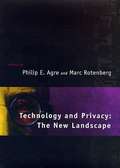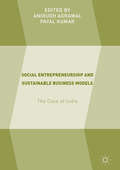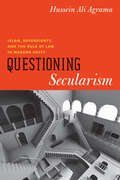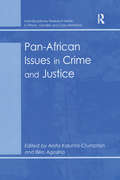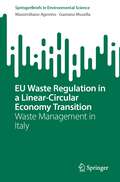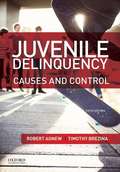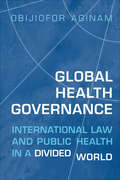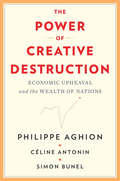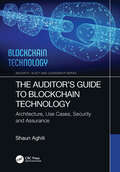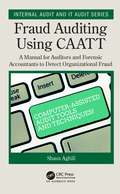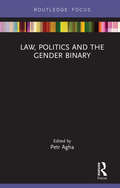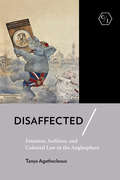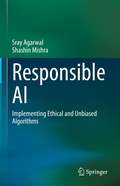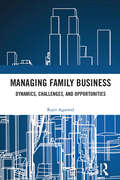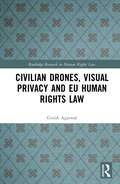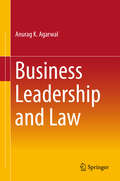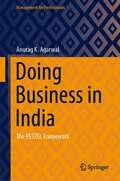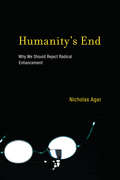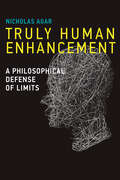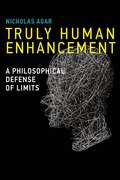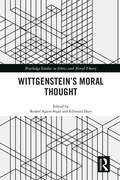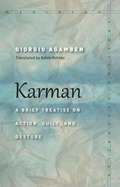- Table View
- List View
Domestic Secrets: Women and Property in Sweden, 1600-1857
by Maria AgrenBetween the seventeenth and nineteenth centuries, women's role in the Swedish economy was renegotiated and reconceptualized. Maria Agren chronicles changes in married women's property rights, revealing the story of Swedish women's property as not just a simple narrative of the erosion of legal rights, but a more complex tale of unintended consequences. A public sphere of influence--including the wife's family and the local community--held sway over spousal property rights throughout most of the seventeenth century, Agren argues. Around 1700, a campaign to codify spousal property rights as anarcanum domesticum, or domestic secret, aimed to increase efficiency in legal decision making. New regulatory changes indeed reduced familial interference, but they also made families less likely to give land to women. The advent of the print medium ushered property issues back into the public sphere, this time on a national scale, Agren explains. Mass politicization increased sympathy for women, and public debate popularized more progressive ideas about the economic contributions of women to marriage, leading to mid-nineteenth-century legal reforms that were more favorable to women. Agren's work enhances our understanding of how societies have conceived of women's contributions to the fundamental institutions of marriage and the family, using as an example a country with far-reaching influence during and after the Enlightenment.
Technology and Privacy: The New Landscape
by Philip E. Agre Marc RotenbergPrivacy is the capacity to negotiate social relationships by controlling access to personal information. As laws, policies, and technological design increasingly structure people's relationships with social institutions, individual privacy faces new threats and new opportunities. Over the last several years, the realm of technology and privacy has been transformed, creating a landscape that is both dangerous and encouraging. Significant changes include large increases in communications bandwidths; the widespread adoption of computer networking and public-key cryptography; mathematical innovations that promise a vast family of protocols for protecting identity in complex transactions; new digital media that support a wide range of social relationships; a new generation of technologically sophisticated privacy activists; a massive body of practical experience in the development and application of data-protection laws; and the rapid globalization of manufacturing, culture, and policy making. The essays in this book provide a new conceptual framework for the analysis and debate of privacy policy and for the design and development of information systems. The authors are international experts in the technical, economic, and political aspects of privacy; the book's strength is its synthesis of the three. The book provides equally strong analyses of privacy issues in the United States, Canada, and Europe. Contributors: Philip E. Agre, Victoria Bellotti, Colin J. Bennett, Herbert Burkert, Simon G. Davies, David H. Flaherty, Robert Gellman, Viktor Mayer-Schouml;nberger, David J. Phillips, Rohan Samarajiva.
Social Entrepreneurship and Sustainable Business Models: The Case Of India
by Anirudh Agrawal Payal KumarAddressing the need for further theorisation and operationalisation of social entrepreneurship in India, this edited collection provides a critical and deeper understanding of the social entrepreneurial ecosystem. Covering topics such as entrepreneurial intentions, empathy, impact investment and standardised social measures, the contributors explore the potential of social entrepreneurship and sustainable business models in an Indian context. Offering empirical cases and presenting a realistic perspective of the social entrepreneurship landscape in India, this collection will undoubtedly be of value to those interested in creating a social and sustainable impact in business and society.
Questioning Secularism: Islam, Sovereignty, and the Rule of Law in Modern Egypt (Chicago Studies in Practices of Meaning)
by Hussein Ali AgramaThe central question of the Arab Spring-what democracies should look like in the deeply religious countries of the Middle East-has developed into a vigorous debate over these nations' secular identities. But what, exactly, is secularism? What has the West's long familiarity with it inevitably obscured? In Questioning Secularism, Hussein Ali Agrama tackles these questions. Focusing on the fatwa councils and family law courts of Egypt just prior to the revolution, he delves deeply into the meaning of secularism itself and the ambiguities that lie at its heart. Drawing on a precedent-setting case arising from the family law courts -the last courts in Egypt to use Shari'a law-Agrama shows that secularism is a historical phenomenon that works through a series of paradoxes that it creates. Digging beneath the perceived differences between the West and Middle East, he highlights secularism's dependence on the law and the problems that arise from it: the necessary involvement of state sovereign power in managing the private spiritual lives of citizens and the irreducible set of legal ambiguities such a relationship creates. Navigating a complex landscape between private and public domains, Questioning Secularism lays important groundwork for understanding the real meaning of secularism as it affects the real freedoms of a citizenry, an understanding of the utmost importance for so many countries that are now urgently facing new political possibilities.
Pan-African Issues in Crime and Justice (Interdisciplinary Research Series in Ethnic, Gender and Class Relations)
by Biko AgozinoCriminology assumes the position of an established discipline, yet its influence is limited by its primary focus on the West for both theoretical and empirical substance. But the growing interest in comparative criminology now means that countries compare notes, thereby broadening the parameters of criminology. Still relatively ignored in the literature, however, are issues of crime and justice as they affect people of African descent around the globe. Drawing upon materials from countries in Africa, the Caribbean, North and South America, and Europe, this stimulating book reflects on the experiences of people of African descent to offer a convergence of criminologies in and outside the West. Simultaneously, it acknowledges Western criminology as a significant angle from which to comprehend crime and justice as they are conceptualized outside the West. The volume also investigates whether Western criminological accounts are relevant to the comprehension of crime, criminality and systems of justice in Africa, the Caribbean and South America.
EU Waste Regulation in a Linear-Circular Economy Transition: Waste Management in Italy (SpringerBriefs in Environmental Science)
by Massimiliano Agovino Gaetano MusellaWaste management is a topical issue worldwide. In recent years, several requests have been made by citizens and associations to political decision-makers regarding the need for a significant improvement in waste management methods. Particularly considering the significant increase in awareness of social and environmental impacts and the economic consequences of non-virtuous waste management. There is growing attention on legislation and regulation's role in the waste sector. Regulation can help companies and citizens achieve a faster, more effective, and more efficient transition from a linear economy, based on the take-make-dispose paradigm, to a circular economy, in which the potential of waste as resources and secondary raw materials is exploited. This book is set in the wake of economic literature that tackles the transition from the linear to the circular economy. It focuses on the downstream stages of the waste management process (i.e. the waste treatment phase). In this regard, it is proposed a journey through the history of European waste legislation to study the waste sector's transition dynamics from a selfish and no longer sustainable economic model based on rampant consumerism to a far-sighted sustainable model addressing the well-being of future generations. Studying the changes in European waste regulations leads us to ask ourselves the following questions: how has waste collection changed in recent years? What are the new regulatory challenges that must be addressed to achieve the objectives of a circular economy? How successful has the EU legislation been in fostering the transition from a linear to a circular economy? Finally, has the European environmental legislation sprung a convergence process among European countries towards the circular economy, or has the definition of targets fuelled the already marked differences between EU countries?
Employment Equity in Canada
by Carol AgocsIn the mid-1980s, the Abella Commission on Equality in Employment and the federal Employment Equity Act made Canada a policy leader in addressing systemic discrimination in the workplace. More than twenty-five years later, Employment Equity in Canada assembles a distinguished group of experts to examine the state of employment equity in Canada today.Examining the evidence of nearly thirty years, the contributors - both scholars and practitioners of employment policy - evaluate the history and influence of the Abella Report, the impact of Canada's employment equity legislation on equality in the workplace, and the future of substantive equality in an environment where the Canadian government is increasingly hostile to intervention in the workplace. They compare Canada's legal and policy choices to those of the United States and to the UN Convention on the Rights of Persons with Disabilities, and examine ways in which the concept of employment equity might be expanded to embrace other vulnerable communities. Their observations will be essential reading for those seeking to understand the past, present, and future of Canadian employment and equity policy.
Juvenile Delinquency: Causes and Control (Fifth Edition)
by Robert Agnew Timothy BrezinaAn essential resource for exploring juvenile delinquency in the twenty-first century, Juvenile Delinquency: Causes and Control, Fifth Edition, offers a clear and concise overview of the latest theories and research on the causes and control of delinquency. Instead of attempting to provide a sweeping view of the entire subject, Robert Agnew and new coauthor Timothy Brezina organize the text around three major questions: What is the nature and extent of delinquency? What are the causes of delinquency? What strategies should we employ to control delinquency? These thought-provoking questions draw students into the text, challenging them to use major theories to explain the basic facts about delinquency, to understand the research on its causes, and to develop and evaluate programs and policies for its control.
Global Health Governance: International Law and Public Health in a Divided World
by Obijiofor AginamGlobalization has immersed all of humanity in a single germ pool. There are no health sanctuaries in a globalizing world. In Global Health Governance, Obijiofor Aginam explores the relevance of international law in contemporary public health diplomacy. He focuses on the concept of mutual vulnerability to explore the globalization of disease, in what is paradoxically a global village and a divided world. Drawing from a wide range of disciplines, Global Health Governance offers a holistic approach to global health governance involving a multiplicity of actors: nation-states, international organizations, civil society organizations, and private actors. Aginam articulates modest proposals under the rubric of communitarian globalism, a paradigm that strives to meet the ideals of 'law of humanity.' These proposals project a humane global health order where all of humanity is inexorably tied into a global compact and where the health of one nation-state rises and falls with the health of others. International law—with its bold claims to universal protection of human rights and human dignity—is an indispensable governance tool for the reconstruction of damaged public health trust in the relations of nations and peoples.
The Power of Creative Destruction: Economic Upheaval and the Wealth of Nations
by Philippe Aghion Céline Antonin Simon BunelFrom one of the world’s leading economists and his coauthors, a cutting-edge analysis of what drives economic growth and a blueprint for prosperity under capitalism. Crisis seems to follow crisis. Inequality is rising, growth is stagnant, the environment is suffering, and the COVID-19 pandemic has exposed every crack in the system. We hear more and more calls for radical change, even the overthrow of capitalism. But the answer to our problems is not revolution. The answer is to create a better capitalism by understanding and harnessing the power of creative destruction—innovation that disrupts, but that over the past two hundred years has also lifted societies to previously unimagined prosperity. To explain, Philippe Aghion, Céline Antonin, and Simon Bunel draw on cutting-edge theory and evidence to examine today’s most fundamental economic questions, including the roots of growth and inequality, competition and globalization, the determinants of health and happiness, technological revolutions, secular stagnation, middle-income traps, climate change, and how to recover from economic shocks. They show that we owe our modern standard of living to innovations enabled by free-market capitalism. But we also need state intervention with the appropriate checks and balances to simultaneously foster ongoing economic creativity, manage the social disruption that innovation leaves in its wake, and ensure that yesterday’s superstar innovators don’t pull the ladder up after them to thwart tomorrow’s. A powerful and ambitious reappraisal of the foundations of economic success and a blueprint for change, The Power of Creative Destruction shows that a fair and prosperous future is ultimately ours to make.
The Auditor’s Guide to Blockchain Technology: Architecture, Use Cases, Security and Assurance (Security, Audit and Leadership Series)
by Shaun AghiliThe 21st century has been host to a number of information systems technologies in the areas of science, automotive, aviation and supply chain, among others. But perhaps one of its most disruptive is blockchain technology whose origin dates to only 2008, when an individual (or perhaps a group of individuals) using the pseudonym Satoshi Nakamoto published a white paper entitled Bitcoin: A peer-to-peer electronic cash system in an attempt to address the threat of “double- spending” in digital currency. Today, many top-notch global organizations are already using or planning to use blockchain technology as a secure, robust and cutting-edge technology to better serve customers. The list includes such well-known corporate entities as JP Morgan, Royal Bank of Canada, Bank of America, IBM and Walmart. The tamper-proof attributes of blockchain, leading to immutable sets of transaction records, represent a higher quality of evidence for internal and external auditors. Blockchain technology will impact the performance of the audit engagement due to its attributes, as the technology can seamlessly complement traditional auditing techniques. Furthermore, various fraud schemes related to financial reporting, such as the recording of fictitious revenues, could be avoided or at least greatly mitigated. Frauds related to missing, duplicated and identical invoices can also be greatly curtailed. As a result, the advent of blockchain will enable auditors to reduce substantive testing as inherent and control audit risks will be reduced thereby greatly improving an audit’s detection risk. As such, the continuing use and popularity of blockchain will mean that auditors and information systems security professionals will need to deepen their knowledge of this disruptive technology. If you are looking for a comprehensive study and reference source on blockchain technology, look no further than The Auditor’s Guide to Blockchain Technology: Architecture, Use Cases, Security and Assurance. This title is a must read for all security and assurance professionals and students looking to become more proficient at auditing this new and disruptive technology.
Fraud Auditing Using CAATT: A Manual for Auditors and Forensic Accountants to Detect Organizational Fraud (Internal Audit and IT Audit)
by Shaun AghiliThis book discusses various common occupational and organizational fraud schemes, based on the Association of Certified Fraud Examiners (ACFE) fraud tree and assist fraud examiners and auditors in correctly choosing the appropriate audit tests to uncover such various fraud schemes. The book also includes information about audit test red flags to watch out for, a list of recommended controls to help prevent future fraud related incidents, as well as step-by-step demonstrations of a number of common audit tests using IDEA® as a CAATT tool.
Law, Politics and the Gender Binary
by Petr AghaThe distinction between male and female, or masculinity and femininity, has long been considered to be foundational to society and the organization of its institutions. In the last decades, the massive literature on gender has challenged this discursive construction. Gender has been disassembled and reassembled, variously considered as social practice, performance, ideology. Yet the binary relationship ‘man/woman’ continues to be a characteristic trait of Western societies. This book gathers together contributions by experts in various fields – including law, sociology, philosophy and anthropology – to pin down the relationship between institutions and the gender binary. Centrally, it examines the way in which the present-day gender binary is shored up by the conceptualization and regulation of sex and gender at societal and institutional levels. Based on this examination, it tackles the issue of what the practices and processes of subjectivation are that preserve this binary distinction as the foundation of gender. Each of the chapters discusses this pressing question with a view to considering whether current equality policies challenge hierarchical and hegemonic understandings of gender or are the residue of a sexist understanding of gender. This analysis then paves the way for a more general and crucial question: whether institutions can, or should, contribute to the process of deconstructing the gender binary.
Disaffected: Emotion, Sedition, and Colonial Law in the Anglosphere (Corpus Juris: The Humanities in Politics and Law)
by Tanya AgathocleousDisaffected examines the effects of antisedition law on the overlapping public spheres of India and Britain under empire. After 1857, the British government began censoring the press in India, culminating in 1870 with the passage of Section 124a, a law that used the term "disaffection" to target the emotional tenor of writing deemed threatening to imperial rule. As a result, Tanya Agathocleous shows, Indian journalists adopted modes of writing that appeared to mimic properly British styles of prose even as they wrote against empire. Agathocleous argues that Section 124a, which is still used to quell political dissent in present-day India, both irrevocably shaped conversations and critiques in the colonial public sphere and continues to influence anticolonialism and postcolonial relationships between the state and the public. Disaffected draws out the coercive and emotional subtexts of law, literature, and cultural relationships, demonstrating how the criminalization of political alienation and dissent has shaped literary form and the political imagination.
Responsible AI: Implementing Ethical and Unbiased Algorithms
by Sray Agarwal Shashin MishraThis book is written for software product teams that use AI to add intelligent models to their products or are planning to use it. As AI adoption grows, it is becoming important that all AI driven products can demonstrate they are not introducing any bias to the AI-based decisions they are making, as well as reducing any pre-existing bias or discrimination. The responsibility to ensure that the AI models are ethical and make responsible decisions does not lie with the data scientists alone. The product owners and the business analysts are as important in ensuring bias-free AI as the data scientists on the team. This book addresses the part that these roles play in building a fair, explainable and accountable model, along with ensuring model and data privacy. Each chapter covers the fundamentals for the topic and then goes deep into the subject matter – providing the details that enable the business analysts and the data scientists to implement these fundamentals. AI research is one of the most active and growing areas of computer science and statistics. This book includes an overview of the many techniques that draw from the research or are created by combining different research outputs. Some of the techniques from relevant and popular libraries are covered, but deliberately not drawn very heavily from as they are already well documented, and new research is likely to replace some of it.
Managing Family Business: Dynamics, Challenges, and Opportunities
by Rajiv AgarwalThis book explores the unique characteristics and complexities of family businesses in India. It examines the intersection of family dynamics, cultural norms, and business practices, to offer valuable insights on how family businesses evolve, develop, grow, and sustain over time. With a focus on leadership and positioning for the future, this book illustrates how the family enterprise can achieve sustained growth and continuity through generations. Covering a wide range of topics essential for understanding the Indian family business landscape, this volume: Studies succession planning and governance, managing family conflicts and harnessing innovation Analyses the various strengths and weaknesses of family businesses Shares insights on top-performing family businesses alongside the oldest businesses in India and across the world Emphasises and extensively discusses the role of women in the contemporary Indian business landscape Insightful and engaging, this book will be useful to students, researchers, and teachers in the fields of business management, commerce, and economics. It will also be an invaluable resource for present or potential family business owners, managers, professionals, and business consultants.
Managing Family Business: Dynamics, Challenges, and Opportunities
by Rajiv AgarwalThis book explores the unique characteristics and complexities of family businesses in India. It examines the intersection of family dynamics, cultural norms, and business practices to offer valuable insights on how family businesses evolve, develop, grow, and sustain over time. With a focus on leadership and positioning for the future, this book illustrates how the family enterprise can achieve sustained growth and continuity through generations.Covering a wide range of topics essential for understanding the Indian family business landscape, this volume: Studies succession planning and governance, managing family conflicts and harnessing innovation Analyses the various strengths and weaknesses of family businesses Shares insights on top-performing family businesses alongside the oldest businesses in India and across the world Emphasises and extensively discusses the role of women in the contemporary Indian business landscape Insightful and engaging, this book will be useful to students, researchers, and teachers in the fields of business management, commerce, and economics. It will also be an invaluable resource for present or potential family business owners, managers, professionals, and business consultants.
Civilian Drones, Visual Privacy and EU Human Rights Law (Routledge Research in Human Rights Law)
by Girish AgarwalThis book examines rights issues in relation to visual privacy in the use of civilian drones. Here, visual privacy is described as the freedom from a combination of unwanted activities directed towards an individual, such as observing, recording, and publishing of personal visual information without an individual’s consent. The book answers the question of whether visual observation of an individual with the help of the camera systems onboard a civilian drone is lawful in light of EU law. It also discusses the legality of the subsequent recordings and publications. The issues are considered in terms of the European Convention of Human Rights, the Charter of Fundamental Rights of the European Union, the case law of the European Court of Human Rights and the Court of Justice of the European Union and EU General Data Protection Regulation. The book will be a valuable resource for researchers, academics and policy-makers working in the areas of technology, privacy and human rights law.
Business Leadership and Law
by Anurag K. AgarwalThis book discusses doing business and making profit on the right side of the law. It explores the role of aligning business and legal strategies, and using the law as a powerful tool in making businesses successful. In this unique book, the author draws on his experience teaching future business leaders at the IIM Ahmedabad for more than a decade. Numerous case studies from across the globe and involving top-notch companies are discussed from both the business leadership and legal perspective, with takeaways included at the end. Intended for senior managers who would prefer to have the law as their friend, philosopher and guide, the book offers analyses of judgments from various courts, but mainly from the Supreme Court of India and the US Supreme Court, and provides judicial finality on several issues commonly faced by business leaders. As such, it serves as a valuable reference guide for senior business managers aspiring to take on top leadership positions.
Doing Business in India: The PESTEL Framework (Management for Professionals)
by Anurag K. AgarwalThe book focuses on the different aspects of business in India required to be taken care of by any businessperson, especially a foreigner, willing to do business in India. India is known for “unity in diversity.” The country being a very old civilization, and of continental size with great diversity, often remains a mystery for most of the foreign investors and businesspersons who get very easily attracted to it because of the humongous market and its potential. The book goes deep into the various important aspects of business in India which essentially hold the key to success of a business venture. A good understanding of the political, economic, social, technological, environmental, and legal aspects (the PESTEL framework) of the business environment in the country holds a businessperson in good stead in comparison with others who have little or no idea of the big picture. The book discusses these aspects with pertinent examples to make understanding their interplay easy. Any person unfamiliar with India as a country will get a good idea of different aspects of the country through the PESTEL framework and will be able to understand the true meaning of unity in diversity. Also, it makes it possible for someone well versed with the system of business in India to appreciate the finer aspects. The book is divided into three modules. The first module provides an overview of business in India, scope and potential for growth, opportunities, and some good success stories. The second module goes into the details of the PESTEL framework and discusses each arm at length. The combined study of numerous factors, which has been divided into different heads for better understanding, brings out many stories giving a fantastic learning experience. A closer look at how things are changing and what can be anticipated arguably is the most important part of the book, providing pointers to remain connected with day-to-day happenings. The third module goes into the practical aspects of doing business and deals with investment, establishing and running a business in India. Altogether, the book is a complete package to facilitate ease of business in the country and will be of interest to practitioners, policy makers and researchers working in this field.
Humanity's End: Why We Should Reject Radical Enhancement (Life and Mind: Philosophical Issues in Biology and Psychology)
by Nicholas AgarAn argument that achieving millennial life spans or monumental intellects will destroy values that give meaning to human lives.Proposals to make us smarter than the greatest geniuses or to add thousands of years to our life spans seem fit only for the spam folder or trash can. And yet this is what contemporary advocates of radical enhancement offer in all seriousness. They present a variety of technologies and therapies that will expand our capacities far beyond what is currently possible for human beings. In Humanity's End, Nicholas Agar argues against radical enhancement, describing its destructive consequences. Agar examines the proposals of four prominent radical enhancers: Ray Kurzweil, who argues that technology will enable our escape from human biology; Aubrey de Grey, who calls for anti-aging therapies that will achieve “longevity escape velocity”; Nick Bostrom, who defends the morality and rationality of enhancement; and James Hughes, who envisions a harmonious democracy of the enhanced and the unenhanced. Agar argues that the outcomes of radical enhancement could be darker than the rosy futures described by these thinkers. The most dramatic means of enhancing our cognitive powers could in fact kill us; the radical extension of our life span could eliminate experiences of great value from our lives; and a situation in which some humans are radically enhanced and others are not could lead to tyranny of posthumans over humans.
Truly Human Enhancement: A Philosophical Defense of Limits (Basic Bioethics)
by Nicholas AgarA nuanced discussion of human enhancement that argues for enhancement that does not significantly exceed what is currently possible for human beings.The transformative potential of genetic and cybernetic technologies to enhance human capabilities is most often either rejected on moral and prudential grounds or hailed as the future salvation of humanity. In this book, Nicholas Agar offers a more nuanced view, making a case for moderate human enhancement—improvements to attributes and abilities that do not significantly exceed what is currently possible for human beings. He argues against radical human enhancement, or improvements that greatly exceed current human capabilities.Agar explores notions of transformative change and motives for human enhancement; distinguishes between the instrumental and intrinsic value of enhancements; argues that too much enhancement undermines human identity; considers the possibility of cognitively enhanced scientists; and argues against radical life extension. Making the case for moderate enhancement, Agar argues that many objections to enhancement are better understood as directed at the degree of enhancement rather than enhancement itself. Moderate human enhancement meets the requirement of truly human enhancement. By radically enhancing human cognitive capabilities, by contrast, we may inadvertently create beings (“post-persons”) with moral status higher than that of persons. If we create beings more entitled to benefits and protections against harms than persons, Agar writes, this will be bad news for the unenhanced. Moderate human enhancement offers a more appealing vision of the future and of our relationship to technology.
Truly Human Enhancement
by Nicholas AgarThe transformative potential of genetic and cybernetic technologies to enhance human capabilities is most often either rejected on moral and prudential grounds or hailed as the future salvation of humanity. In this book, Nicholas Agar offers a more nuanced view, making a case for moderate human enhancement -- improvements to attributes and abilities that do not significantly exceed what is currently possible for human beings. He argues against radical human enhancement, or improvements that greatly exceeds current human capabilities. Agar explores notions of transformative change and motives for human enhancement; distinguishes between the instrumental and intrinsic value of enhancements; argues that too much enhancement undermines human identity; considers the possibility of cognitively enhanced scientists; and argues against radical life extension. Making the case for moderate enhancement, Agar argues that many objections to enhancement are better understood as directed at the degree of enhancement rather than enhancement itself. Moderate human enhancement meets the requirement of truly human enhancement. By radically enhancing human cognitive capabilities, by contrast, we may inadvertently create beings ("post-persons") with moral status higher than that of persons. If we create beings more entitled to benefits and protections against harms than persons, Agar writes, this will be bad news for the unenhanced. Moderate human enhancement offers a more appealing vision of the future and of our relationship to technology.
Wittgenstein’s Moral Thought (Routledge Studies in Ethics and Moral Theory)
by Reshef Agam-Segal Edmund DainWittgenstein’s work, early and later, contains the seeds of an original and important rethinking of moral or ethical thought that has, so far, yet to be fully appreciated. The ten essays in this collection, all specially commissioned for this volume, are united in the claim that Wittgenstein’s thought has much to contribute to our understanding of this fundamental area of philosophy and of our lives. They take up a variety of different perspectives on this aspect of Wittgenstein’s work, and explore the significance of Wittgenstein’s moral thought throughout his work, from the Tractatus Logico-Philosophicus, and Wittgenstein’s startling claim there that there can be no ethical propositions, to the Philosophical Investigations.
Karman: A Brief Treatise on Action, Guilt, and Gesture (Meridian: Crossing Aesthetics)
by Giorgio Agamben Adam KotskoWhat does it mean to be responsible for our actions? In this brief and elegant study, Giorgio Agamben traces our most profound moral intuitions back to their roots in the sphere of law and punishment. Moral accountability, human free agency, and even the very concept of cause and effect all find their origin in the language of the trial, which Western philosophy and theology both transform into the paradigm for all of human life. In his search for a way out of this destructive paradigm, Agamben not only draws on minority opinions within the Western tradition but engages at length with Buddhist texts and concepts for the first time. In sum, Karman deepens and rearticulates some of Agamben's core insights while breaking significant new ground.

